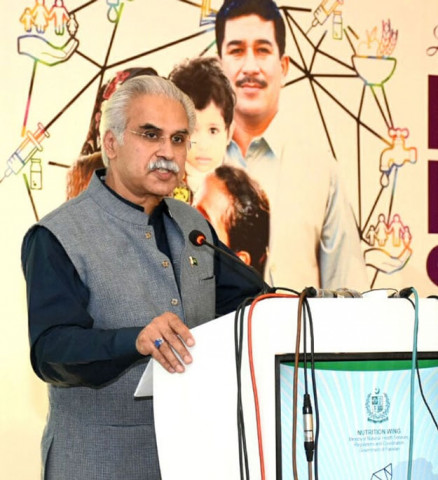SAPM terms population, resources balance vital
Lawmakers call for better urban planning, evolving political commitment

Dr Zafar Mirza - Special Assistant to the PM on Health. PHOTO: FILE
This was stated by the Special Assistant to the Prime Minister on Health (SAPM) Dr Zafar Mirza as he addressed the 20th Annual Population Research Conference of Population Association of Pakistan. The two-day conference had been organised by the Population Council.
During the conference, a new narrative on population developed by the council through a consultative process was introduced. The new narrative is based on promoting a rights-based approach.
Under the new narrative, parents have the right to freely and responsibly decide the number and spacing of their children to fulfil the fundamental rights of children by maintaining a balance between their family size and resources.
On the other hand, the government and society are responsible for facilitating parents in achieving this balance by providing universal access to family planning information and services, thereby achieving sustainable development.
Earlier, Dr Mirza endorsed the national narrative on population and the importance of creating a balance.
Reaffirming the government’s role in providing quality family planning services to citizens, the SAPM said that his ministry has piloted a model community welfare centre in the federal capital which will provide comprehensive family planning and health services to communities.
“The government is providing modern contraceptives through its service delivery network across Pakistan,” Dr Mirza said, adding, “I urge the provincial and regional governments to integrate family planning services with health services to improve the overall quality of life for our people.”
A panel discussion involving parliamentarians, civil society members and media personnel on population narrative and impact of rapid population growth on the country’s development was also held. The talk involved former senator Farhatullah Babar, Senator Mushahid Hussain Syed, Senator Ateeq Shaikh, Planning and Reform Parliamentary Secretary Kanwal Shauzab, Muhammad Malick, and Youth Representative Ali Moeen Nawazish.
Highlighting the impact of fast population growth, Nawazish stressed the need for developing awareness campaigns for youth on family planning and cross-sectoral impact of large population growth.
Pakistan Peoples Party (PPP) member and former senator Babar lauded the new narrative which had been developed by the council and assured that his party will support it and any legislation on similar issues in parliament.
Senator Syed said that there has been a lack of political commitment on the issue of population increase.
“Even though there is an overall consensus across party lines on this issue, there is a need to show collective will through supportive legislation to promote family planning,” he said.
Muttahida Qaumi Movement-Pakistan (MQM-P) Senator Shaikh (MQM) highlighted the challenges faced by the country owing to due to the ever-increasing population, especially in urban areas of Sindh.
He called for better urban planning to handle this population explosion besides ensuring sustainable population growth. He also emphasized the need for following in the footsteps of other Muslim countries such as Turkey, Indonesia and Bangladesh on population planning.
Pakistan Tehreek-i-Insaf (PTI) Kanwal Shauzab welcomed the new narrative on population and apprised the audience on the steps which have been taken by the government so far to achieve sustainable population growth.
Representing the media, Malick called for a forging an alliance between media and organizations which are working on population and family planning issues.
He, however, lamented, that in the race for higher ratings, the media tends to ignore issues such as population and family planning.
Dr Attiya Inayatullah, Population Association of Pakistan (PAP) President Professor Dr Mohammad Nizamuddin, lawmakers, representatives of UN agencies, diplomats, and civil society representatives attended the discussion.
Published in The Express Tribune, November 29th, 2019.



















COMMENTS
Comments are moderated and generally will be posted if they are on-topic and not abusive.
For more information, please see our Comments FAQ